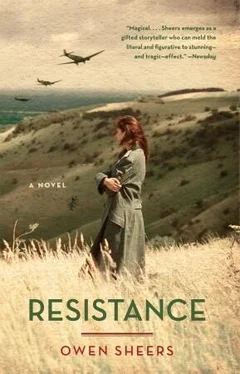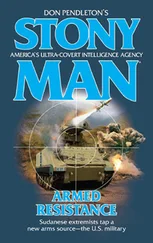But what of the other map? The one he’d been sent here to look for? If the SS thought it important enough to form this patrol, to break with protocol and commandeer a Wehrmacht officer, then surely it was important enough for them to chase him up? But they hadn’t. For a month now there had been nothing but silence despite Albrecht’s regular listening. Because he had, after all, been awaiting further instructions. That much at least was true. But that was all he’d been doing. Waiting and listening, nothing more.
The morning he and Steiner climbed to the head of the valley, they had, as they’d suspected, found a radio signal. Together they’d sat on two bilberry hummocks on either side of the radio and listened as fragments of the world beyond came to them out of the cold mountain air. Snatches of orders, information, captains reporting to colonels reporting to generals. As Steiner tuned through the frequencies, they’d heard the war again. Gunfire, mortar explosions, even once the moans of an injured man faint in the background. When he’d switched frequencies, they’d heard music too. Classical, big band, swing, and even some jazz. “Negro music,” Steiner had said with distaste, holding one earpiece to the side of his head and frowning.
They also heard the news. Faintly, from far away in English on the BBC and then stronger and louder in German on what Albrecht presumed was the new services propaganda station. The two voices gave very different pictures of what was happening in the heart of England. They both agreed on one point, however. London was still standing, as Albrecht knew she would be. She was surrounded, her supply lines cut off, but she was still British. But now there was a second offensive on Birmingham too, a double-pronged attack on England’s two major cities. According to the German station, its news declared in declamatory style, the Japanese were also making further advances in the Pacific. Meanwhile lost territory in North Africa and the Western Desert was being reclaimed by bolstered Italian and German forces. The Allied armies were scattered and stretched. The Axis alliance was on the verge of victory. But still the war was grinding on.
After the silence of the valley, its deep solitude of centuries, the radio was a sudden and awful reminder of where they’d come from and, for Albrecht, of what they must avoid. It also reminded him of exactly who they were: two invading soldiers living in a stolen house watching over a group of frightened farm women. And that is why they’d just listened that morning. Albrecht did not order Steiner to transmit anything. At that point there had been nothing to report beyond the missing men anyway, but even if there had, Albrecht would have ordered silence instead. It was then, after tuning into the world beyond, as they’d descended back into the isolation of the valley, that Albrecht began lying to his own men, before he’d even spoken to any of them.
To Maggie in her kitchen, however, he was more honest than he had been for years. Help, that is both what he was offering and asking of her. At first she’d stuck to her original position. She couldn’t supply them with anything. None of them could. That would be collaboration. But gradually Albrecht had explained that collaboration was not what he was asking for. His men would simply work for her and the others. To help them through the winter with the jobs that Maggie knew all too well they would never cope with on their own. All he asked was that the patrol be allowed to take back The Court’s original flock, so they might have some extra meat and so the women’s own flocks would be more manageable. Alex could help Maggie with the cows and her horses. “Horses,” he’d explained, “are in Alex’s blood.” Sebald, meanwhile, could offer his medical expertise while the others could offer their energy, their bodies. He was laying himself and his men at her disposal. To get them all through this difficult time while they waited for the world to right itself again, to find its balance.

At some point in that visit, as Albrecht talked to her across her own table, Maggie had glimpsed the man behind the uniform. She’d also seen a man who knew what was happening in the world beyond the valley. Finally, as he’d explained the complexity and seriousness of the situation, quoting from directives in his invasion handbook and showing her a poster he’d been issued with in Oxford, she’d recognised the man who might just keep them all alive. For this reason the next day, after another early morning snowfall, Albrecht, Alex, and Gernot were allowed to begin driving what elements of The Court’s original flock they could still find back to The Court’s lower fields, where Sebald was already smashing the ice in the troughs and filling the mangers with Reg’s stored hay.
Sarah didn’t understand how Maggie could have given in so easily. With the men just two months gone. With the war still being fought, with her own sons in the army. She said as much when all four women met that same day in Mary’s front room. Maggie sat in the armchair by the fire, her skin damp from both the snow and the exertion of her walk to Mary’s. It had been difficult for her to cross the valley. The usual paths were no more than vague depressions in the thickening carpet of white. And under the snow was ice. In all her years in the valley, it was the worst she’d seen. “Well, least it’s not a green’un,” she’d panted to Sarah again over her shoulder as they’d made their way up through the trees on the other side of the river. But there was no way she wouldn’t have come. The soldiers had begun clearing the paths and driving the sheep across early that morning. It was important to Maggie that they all agreed on what was happening. Which they didn’t.
“It’s treason, Maggie, that’s what it is,” Mary said, speaking with the authority of a mother whose long distant son had served in army Intelligence. “An’ it’s a sin too. I pray for you, I really do, Maggie.”
“I know why you done this,” Sarah said, eager to avoid Mary’s preaching. “But there’s no need for it. We don’t need their help. We’ve been gettin’ on just fine, haven’t we?”
“Maybe you have, bach,” Maggie replied, “but I haven’t. I’m done in an’ we all will be soon enough with this upon us.” She looked at the window, at the ice formed on both sides of its pane. “An’ anyway, if we hadn’t taken Reg’s flock in the first place, then those sheep would be theirs as it is.”
“You know that’s not the point,” Sarah said. “Nothing which would be of the slightest help to the enemy.” She raised her eyebrows towards Mary’s “Stand Fast” leaflet tucked into the edge of the mirror above the fire.
“What will Constable Evans say?” Menna said quietly. Maggie shot her a look before addressing Sarah again.
“You want to tell me about advice in leaflets, bach? Then how’s this for some advice?” She reached into the pocket of her cardigan and pulled out the rolled poster Albrecht had given her. Taking her glasses from the other pocket, she flattened the piece of paper over her lap, lowered her head, and read in a slow, careful voice.
“ ‘If the population initiates active operations after the completed conquest of a locality, or in places behind the fighting front, the inhabitants involved in the fighting will be regarded as armed insurgents. When taking hostages, those persons should if possible be selected in whom the active enemy elements have an interest.’ ”
Maggie looked up at the faces of the three women.
“He knows about William an’ the others, see,” she said. “He isn’t stupid. So those persons are us, isn’t it? Now, if they wants to stay here an’ carry on with a bit of farming ’stead of going off an’ wagging their tongues to their superiors, I reckon that’s fine by me. And if they want to help us through this,” she waved a hand at the frozen window, “that’s fine too. Because if they don’t, I reckon it’s the Germans’ll be coming for us, never mind no Constable Evans. And not ones like this lot either.”
Читать дальше













